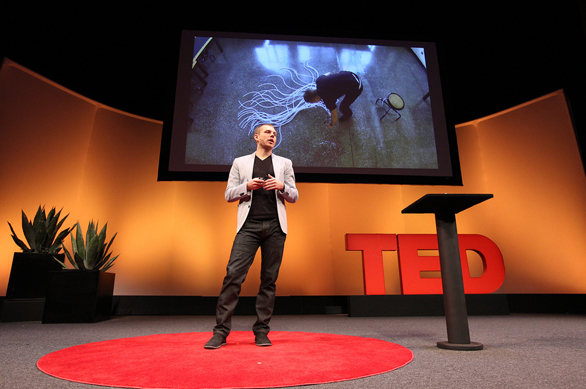
TED Fellow Skylar Tibbits shares 4D printing at TED University. Photo: Ryan Lash
At TED University, members of the TED audience get a chance to step on stage and give a talk — about their work, about their passion, about their life. The talks are always incredible. At TED Universities past, Nina Tandon shared how tissue engineering could potentially lead to personalized medicine, Graham Hill urged us to have less stuff and Bill Gates talked about how state budgets hurt education.
Below, a recap of the talks from TED University session 1 at TED2013, held the morning of Tuesday, Feb. 26.
 Skylar Tibbits: Can we make things that make themselves?
TED Fellow Skylar Tibbits, who gave the talk “Can we make things that make themselves?” at TED2011, unveiled a new concept: 4D printing. These 3D printed objects have a fourth property: transformation that is programmed into the material itself. Think of a strip of material that is able to fold itself into a cube, or a pipe for plumbing with the ability to adjust on its own.
Skylar Tibbits: Can we make things that make themselves?
TED Fellow Skylar Tibbits, who gave the talk “Can we make things that make themselves?” at TED2011, unveiled a new concept: 4D printing. These 3D printed objects have a fourth property: transformation that is programmed into the material itself. Think of a strip of material that is able to fold itself into a cube, or a pipe for plumbing with the ability to adjust on its own.
Susan Kish, the Head of Cross Platform Initiatives at Bloomberg LP, admits that she gets anxious at the thought of a computer problem. And so, she learned to code. A look at the power of understanding code — and why its so important for established business leaders to learn. But perhaps, says Kish, learning to code is even more important for young folks who want to join their ranks someday.
ShaoLan Hsueh shares an easy way to learn Chinese, by connecting characters to facial expressions, body movements and memorable images that conjure up words in English. By learning a base of characters, a full vocabulary isn’t far off. As Hsueh says, it’s “Chineasy.”
 Ric Elias: 3 things I learned while my plane crashed
Ric Elias, who shared “3 things I learned when my plane crashed,” talks about an often-forgotten part of the American immigration issue: education. Less than 5% of undocumented students go to college — not because they don’t want to, but because it’s impossible for them to do so. One part of the problem: In 38 states, undocumented students do not qualify for in-state tuition. Offering some hope: Golden Door scholarships.
Ric Elias: 3 things I learned while my plane crashed
Ric Elias, who shared “3 things I learned when my plane crashed,” talks about an often-forgotten part of the American immigration issue: education. Less than 5% of undocumented students go to college — not because they don’t want to, but because it’s impossible for them to do so. One part of the problem: In 38 states, undocumented students do not qualify for in-state tuition. Offering some hope: Golden Door scholarships.
Jim Ziolkowski headed to Misomali, Malawi, 20 years ago to build a new school — a mission he’s repeated in many countries through his work with BuildOn. Recently, Ziolkowski headed back to Misomali. While many of his friends had succumbed to AIDS, he found many still there, offering inspiration. Now, multiple schools exist in the community.
Morrow Cater shares a stat: only 33% of Republicans in America believe that climate change is the result of burning fossil fuels. Why? Because the fossil fuel industry is good to politicians, because disinformation is everywhere, because conservatives feel scared to speak out against core values, and because liberals often take the high moral ground on this issue, which can be very off-putting. Cater gives a call to stop letting politics divide us.
Want to try on glasses or sunglasses without visiting the store? 1-800-Contacts CEO Jonathan Coon demos an app that allows you to do that, right from your phone. With the app, you can take photos of yourself à la Blaise Aguera Y Arcas’s Photosynth and digitally “try on” sunglasses, in any color, shape and style. You can even slide the glasses up and down your nose.
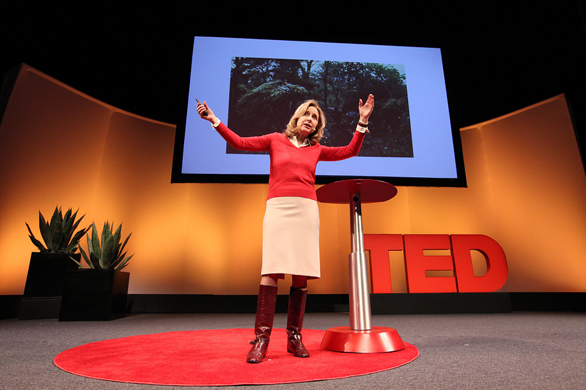
Helen Fisher talks personality attraction at TED University. Photo: Ryan Lash
Helen Fisher, who gave the classic talk on love and cheating, talks about research she did for Match.com on personalities, taking very literally the question of romantic chemistry.
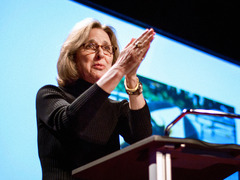 Helen Fisher: The brain in love
Fisher outlines four types of brain systems, based on how expressive they are of dopamine (creative, impulsive types), serotonin (stable, traditional types), testosterone (direct, emotionally contained types), and estrogen and oxytocin (nurturing, harmonious types). Fisher concludes: The Golden Rule is over; instead try the Platinum Rule: Treat others as they want to be treated.
Helen Fisher: The brain in love
Fisher outlines four types of brain systems, based on how expressive they are of dopamine (creative, impulsive types), serotonin (stable, traditional types), testosterone (direct, emotionally contained types), and estrogen and oxytocin (nurturing, harmonious types). Fisher concludes: The Golden Rule is over; instead try the Platinum Rule: Treat others as they want to be treated.
Juan Enriquez, who at TED2009 gave a talk on the next species of human says we have enough trouble hiding stupid tattoos, which are unique, permanent and instantly recognizable. Today he wants you to think about electronic tattoos, that pesky immortal print of you all over the Internet. Today facial recognition allows someone to take a photo of you, tie it to your photo from a social network, and instantly find out all the other information about you. Because of electronic tattoos we all just might be close to immortality.
Judy MacDonald Johnston wants you to think about a topic you probably avoid daily: the fact of dying. Johnston gives five steps to live a good (end of) life: 1. Make a plan 2. Recruit advocates 3. Be hospital ready 4. Choose caregivers 5. Discuss last words.
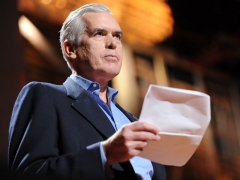 Philip K. Howard: Four ways to fix a broken legal system
Philip K. Howard: Four ways to fix a broken legal system
Common Good founder Philip K. Howard, who gave the TED Talk “Four ways to fix a broken legal system,” talks about how digital technology makes using very old technology all the more interesting. He shows some of his beautiful portraits using a film camera.
Laurie Fabiano, author of Elizabeth Street, took a journey to her family’s coastal hometown of Scilla, Italy, where she discovered incredible stories of life after the 1908 Messina earthquake. The earthquake devastated the lives of her family members, who narrowly survived, only to return home to find most of their friends dead. It made Fabiano think: What other moments in history had been lost because history is so one-sided?
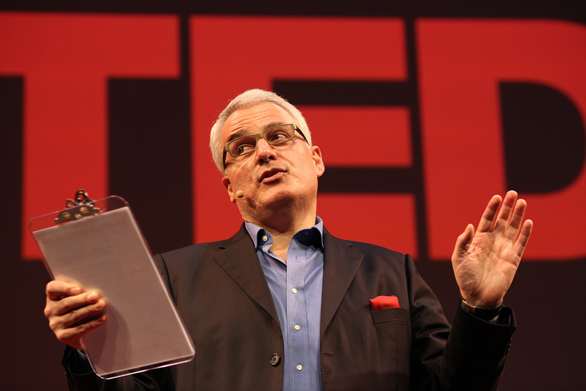
TED’s own Bruno Giussani hosted. Photo: Ryan Lash
Comments (9)
Pingback: TEDGlobal 2013 ConferencePattern Matched Technologies
Pingback: Chineasy uses illustrations to break down and teach Chinese characters - TwoFATGuysBlog.com
Pingback: N4SA.com | Chineasy uses illustrations to break down and teach Chinese characters
Pingback: Chineasy uses illustrations to break down and teach Chinese characters | Article Dominator
Pingback: Chineasy uses illustrations to break down and teach Chinese characters | JVZ News
Pingback: Chineasy uses illustrations to break down and teach Chinese characters - BMAgads.com
Pingback: Google Glass, Facebook, Junk Food, 4d Printing.
Pingback: Welcome to 4D printing: A Q&A with Skylar Tibbits at TED2013 | LiMiT
Pingback: 4D printed objects ‘make themselves’ | SafetyFist.com